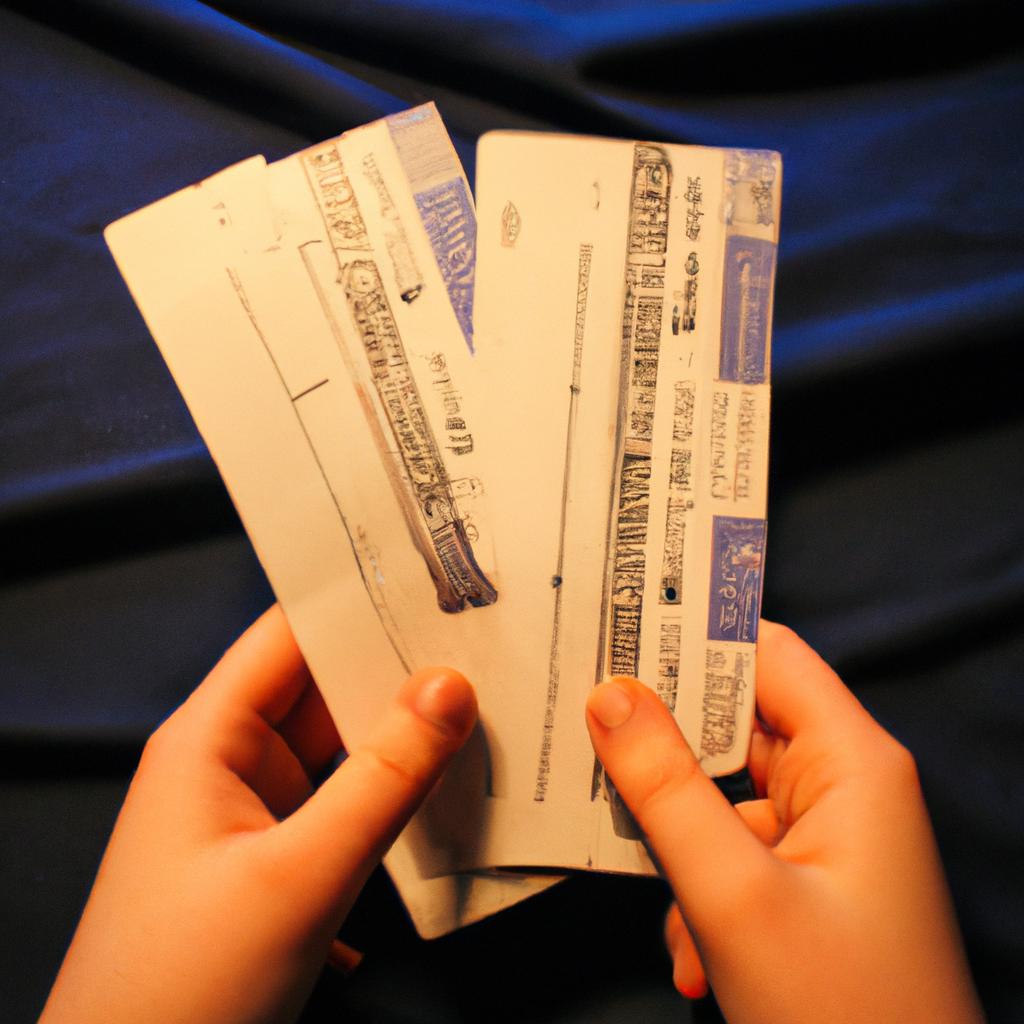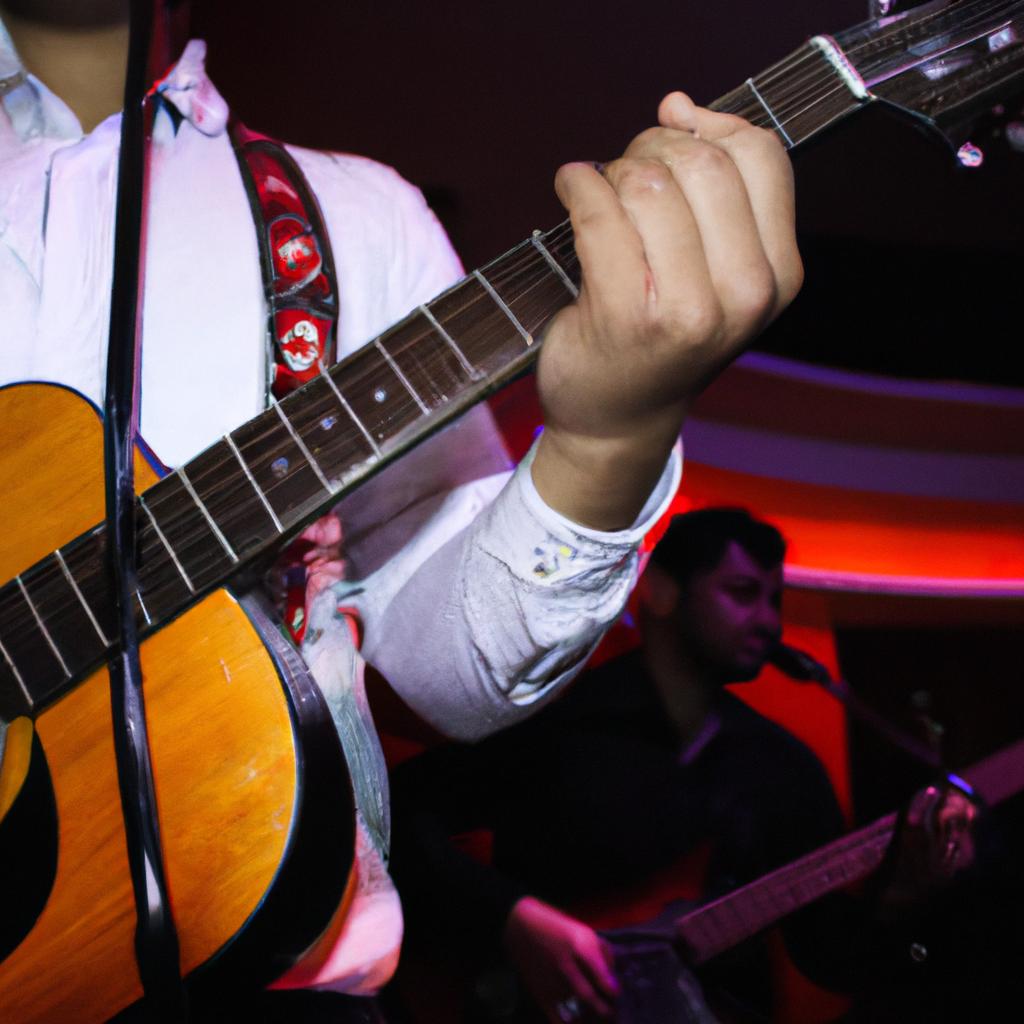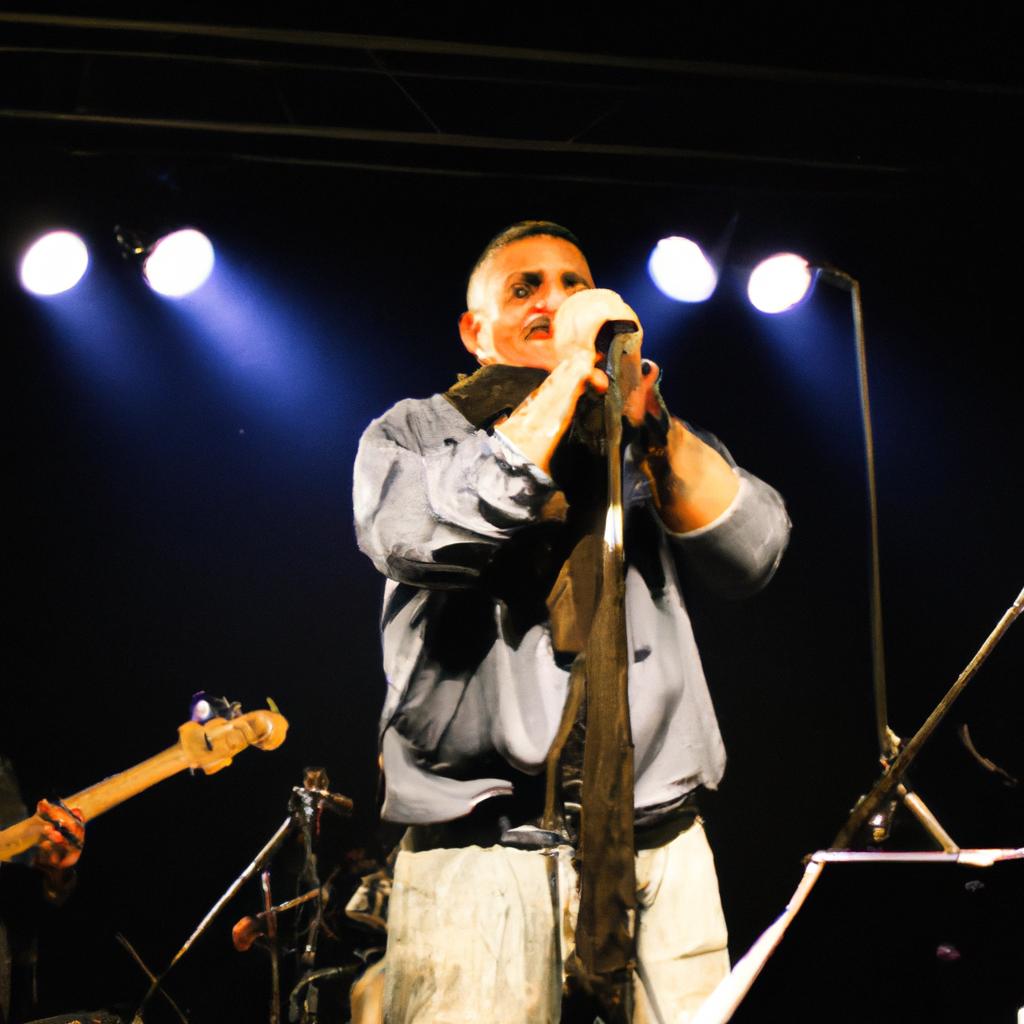Concerts have long been a popular form of entertainment, drawing in crowds and creating memorable experiences for music enthusiasts. However, the cost of attending these events has become a topic of discussion and concern among concertgoers. In recent years, ticket prices for music entertainment have seen a significant increase, leaving many to question whether the enjoyment and excitement of live performances are worth the steep investment.
Consider the case study of an avid fan who eagerly anticipates attending their favorite artist’s concert. This individual saves up diligently, cutting back on expenses in other areas to afford a ticket. Despite their enthusiasm, they find themselves faced with outrageously high prices that surpass their budgetary limitations. As such situations become increasingly common, it becomes crucial to delve deeper into this issue and understand the factors driving ticket price inflation in music entertainment.
Factors influencing ticket prices
Factors Influencing Ticket Prices
The cost of concert tickets is influenced by various factors that determine their pricing. Understanding these factors helps shed light on why ticket prices can vary significantly from one music event to another. This section will explore some key elements that impact the pricing of tickets, providing insights into the complex nature of this industry.
To begin with, one important factor influencing ticket prices is the popularity and demand for a particular artist or band. For instance, let’s consider the case of a globally renowned musician who has released multiple chart-topping albums and consistently sells out arenas around the world. Due to their immense popularity, there is likely to be an overwhelming demand for tickets to their concerts. As a result, concert promoters may increase ticket prices to capitalize on this high level of demand.
Additionally, production costs play a significant role in determining ticket prices. Organizing a live music event involves expenses such as venue rental fees, stage setup, lighting design, sound engineering, and hiring skilled technicians. These costs are often substantial and need to be factored into the overall budget for organizing the concert. Consequently, higher production costs can directly influence ticket prices as organizers aim to cover these expenses while still making a profit.
Furthermore, external economic factors also contribute to fluctuations in ticket pricing. Inflation rates, exchange rates between currencies (in international tours), fuel prices affecting transportation costs for artists and equipment, and even changes in government regulations all have an impact on how much it would cost to bring a music act to different locations around the world. These external conditions can lead to variations in ticket prices across different markets or countries.
In summary, several variables affect the pricing of concert tickets within the music entertainment industry. From supply and demand dynamics driven by an artist’s popularity to production expenses incurred during event planning and execution; each factor contributes either directly or indirectly towards establishing ticket prices. Moreover, external economic conditions also exert an influence on ticket pricing strategies.
Moving forward, we will delve into the role of demand in ticket pricing and explore how consumer preferences and market forces shape this aspect of the music entertainment industry.
The role of demand in ticket pricing
Factors Influencing Ticket Prices in the Music Entertainment Industry
The cost of concert tickets is influenced by various factors that shape their pricing strategies. To understand these influences, let us consider a hypothetical example of a popular music artist planning a world tour. This will provide insights into the complexities involved in determining ticket prices for live music events.
One key factor affecting ticket prices is the production costs associated with organizing and executing concerts. These costs include venue rental fees, stage setup, lighting equipment, sound engineering, and staffing expenses. A high-profile artist might require elaborate staging and advanced technical support to deliver an exceptional experience to their audience. Consequently, such extravagant productions may lead to higher ticket prices as they aim to cover these significant upfront investments.
Another influential factor is the demand for tickets. The popularity of an artist greatly impacts the number of people willing to attend their concerts. High-demand artists often have dedicated fan bases who eagerly await their live performances. As a result, scarcity arises when supply cannot meet this overwhelming demand, allowing organizers to increase ticket prices due to limited availability. Furthermore, special events like farewell tours or one-time reunions generate heightened anticipation among fans, leading to increased willingness to pay premium prices.
To evoke an emotional response from audiences regarding the impact of ticket prices on accessibility and inclusivity within the music entertainment industry:
- Many passionate fans face financial constraints that hinder their ability to afford expensive concert tickets.
- Inflated ticket prices can create disparities in access between different socioeconomic groups.
- Exclusive VIP packages prioritize wealthier individuals over others who may have equal enthusiasm for the artist.
- Exorbitant resale market prices contribute to further exclusionary practices within the industry.
Table: Factors Influencing Ticket Pricing
| Factor | Influence |
|---|---|
| Production Costs | Higher costs lead to higher ticket prices |
| Demand | Scarcity drives up ticket prices |
| Artist Popularity | Higher demand allows for increased prices |
| Accessibility and Inclusivity | High prices create disparities in access |
In summary, ticket prices in the music entertainment industry are influenced by a multitude of factors. Production costs associated with creating memorable live experiences, along with the supply-demand dynamics driven by an artist’s popularity, play significant roles in determining pricing strategies. However, it is crucial to consider the potential consequences of high ticket prices on accessibility and inclusivity within the realm of music concerts.
The subsequent section will delve into how artist popularity directly impacts ticket costs, shedding light on the intricate relationship between an artist’s fame and their concert pricing decisions.
The impact of artist popularity on ticket costs
Demand plays a crucial role in determining the prices of tickets for music entertainment events. By analyzing the level of demand, event organizers can set ticket prices that maximize revenue while ensuring audience attendance. To illustrate this concept, let us consider a hypothetical case study involving a popular rock band planning to perform at a large stadium.
In recent years, the popularity of this band has skyrocketed, leading to an increased demand for their live performances. As a result, concert organizers anticipate high ticket sales and capitalize on this opportunity by setting higher prices. This strategy allows them to align ticket costs with the perceived value associated with attending such an anticipated event.
To further comprehend how demand affects ticket pricing in music entertainment, it is essential to explore key factors that influence audience perception and willingness to pay:
- Scarcity effect: Limited availability of tickets creates a sense of urgency among fans, driving up demand and subsequently increasing prices.
- Exclusivity factor: Events featuring renowned artists or bands often carry prestige and exclusivity, attracting more affluent audiences who are willing to pay premium prices.
- Fan loyalty: Devoted fans may be more likely to purchase tickets at higher prices due to their emotional attachment and desire to support their favorite artist.
- Social media impact: Extensive online presence and engagement through social media platforms can generate hype around concerts, ultimately boosting demand and justifying higher ticket prices.
Table 1: Factors Influencing Audience Perception
| Factor | Influence on Demand |
|---|---|
| Scarcity effect | High |
| Exclusivity | Medium |
| Fan loyalty | Medium |
| Social media | High |
Taking these factors into account when setting ticket prices enables event organizers to strike a balance between generating revenue and satisfying consumer expectations. By recognizing the interplay between supply (limited number of available tickets) and demand (audience interest), organizers can optimize their pricing strategies accordingly.
The influence of demand on ticket prices is just one aspect to consider when exploring the cost of concert attendance. In the following section, we will delve into another significant factor: the impact of artist popularity on ticket costs. Understanding how an artist’s fame affects pricing decisions provides further insight into this complex issue.
As we move forward in examining the factors that contribute to ticket prices in music entertainment, let us now explore how artist popularity influences the cost of attending concerts and live performances.
The influence of venue size on ticket prices
The impact of artist popularity on ticket costs has been extensively explored in the previous section, shedding light on how high demand for certain artists can drive up ticket prices. However, another crucial factor that heavily influences ticket prices in music entertainment is the size of the venue where concerts are held. Let us now delve into this aspect and examine its implications.
To better understand the relationship between venue size and ticket prices, let us consider a hypothetical case study involving two popular artists: Artist A and Artist B. Both artists have comparable levels of fame and talent, but they differ significantly in terms of their choice of venues. Artist A consistently performs at large stadiums with capacities ranging from 50,000 to 80,000 attendees, while Artist B opts for smaller arenas with capacities ranging from 10,000 to 15,000 audience members.
This distinction in venue sizes leads to several noteworthy observations:
- Intimacy vs. grandeur: Smaller venues offer a more intimate concert experience where fans can feel closer to the artist on stage. In contrast, larger stadium shows provide a grander spectacle with massive stages and elaborate production values.
- Supply and demand dynamics: Due to limited seating capacity at smaller arenas, tickets tend to be scarcer compared to stadium shows. This scarcity often drives up demand among fans who value exclusivity or prefer a more personal connection with the artist.
- Economic considerations: Hosting a concert at a large stadium incurs significant expenses such as renting the space, setting up equipment, and ensuring security measures are in place. Consequently, these additional costs may contribute to higher ticket prices for events held at bigger venues.
- Perceived value: Concertgoers often associate attending a performance at an iconic stadium with prestige or bragging rights. As a result, some individuals might be willing to pay premium prices simply because of the perceived status associated with being part of such an event.
Let’s now shift our focus to the subsequent section, which explores additional fees and charges associated with tickets. Understanding these factors is essential in comprehending the full cost implications faced by music enthusiasts when attending concerts.
[Additional fees and charges associated with tickets]
Additional fees and charges associated with tickets
Section H2: The influence of venue size on ticket prices
The cost of concert tickets can vary significantly depending on the size of the venue. Larger venues often command higher ticket prices due to their increased capacity and ability to accommodate more fans. To illustrate this point, let’s consider a hypothetical example involving two concerts by popular artists held in different-sized venues.
Imagine that Artist A is performing at a small local theater with a seating capacity of 500 people, while Artist B is holding a concert at a stadium that can hold up to 50,000 attendees. Despite both artists’ popularity and similar production costs, it is likely that the ticket prices for these events would differ substantially.
There are several factors contributing to this discrepancy:
- Demand and supply dynamics: Smaller theaters have limited seating capacities, resulting in higher demand relative to supply. This scarcity drives up ticket prices as fans compete for the available seats.
- Production expenses: Large venues require extensive setup and logistics to ensure smooth operations during the event. These additional costs may be reflected in higher ticket prices.
- Perceived value: Concerts held in larger stadiums often offer enhanced experiences such as elaborate stage designs, visual effects, and superior sound systems compared to smaller venues. Fans may perceive these added features as valuable and be willing to pay more for them.
- Economic considerations: Artists and promoters take into account potential revenue generation when selecting venues. Booking larger stadiums allows them to reach a broader audience and maximize profits through increased ticket sales.
To further emphasize the impact of venue size on ticket pricing, we present a bullet point list showcasing real-world examples:
- Concert at an intimate club (capacity: 200): Tickets priced at $30-$50
- Arena show (capacity: 15,000): Tickets ranging from $60-$150
- Outdoor festival (capacity: 100,000+): Ticket prices typically between $150-$300
- Stadium tour (capacity: 50,000+): Tickets priced at $100-$500 or more
Table: Ticket Prices Based on Venue Size
| Venue Size | Capacity | Price Range |
|---|---|---|
| Small Theater | 200-1,000 | $30-$150 |
| Arena | 10,000-20,000 | $60-$300 |
| Stadium | 40,000+ | $100-$500+ |
Understanding the influence of venue size on ticket prices provides valuable insight into the cost structure of music entertainment. However, it is essential to explore strategies for finding affordable concert tickets that allow fans to enjoy their favorite artists without breaking the bank.
Transition sentence to next section – Strategies for finding affordable concert tickets:
By exploring various methods and resources, concert enthusiasts can discover opportunities for acquiring reasonably priced tickets while still enjoying unforgettable live performances.
Strategies for finding affordable concert tickets
Additional fees and charges associated with tickets can significantly impact the overall cost of attending a music concert. Understanding these additional expenses is essential for individuals who are budget-conscious or seeking affordable ticket options. For example, let’s consider a hypothetical case where an individual purchases two general admission tickets to a popular music festival priced at $100 each.
Firstly, it is important to note that many ticketing platforms and event organizers impose service fees on top of the base ticket price. These fees cover various administrative costs related to processing and managing ticket sales. In our case study, the service fee adds an extra 10% per ticket, amounting to $20 in total.
Secondly, convenience fees may apply when purchasing tickets online or through specific outlets authorized by event organizers. These fees compensate for the convenience provided by online purchasing platforms or physical locations closer to attendees’ residences. Assuming a convenience fee of $5 per ticket in our scenario, an additional $10 would be added to the total cost.
Moreover, some venues charge parking fees separately from the ticket price. This expense becomes significant if attendees plan to drive their own vehicles rather than relying on public transportation or carpooling options. Let’s say our hypothetical festival charges a flat rate of $15 for parking; this would increase the overall expenditure by another $15.
To summarize, based on our example case study, attending a music festival with two general admission tickets initially priced at $100 each could result in additional expenses totaling approximately $45 ($20 service fee + $10 convenience fee +$15 parking fee). It is crucial for potential concertgoers to factor in these supplementary costs when planning their budgets and considering affordability.
The following bullet point list illustrates key factors contributing to the emotional response evoked by increased ticket prices:
- Financial strain: Additional fees can make concerts less accessible for individuals on tight budgets.
- Disappointment: Higher costs can lead fans to miss out on seeing their favorite artists perform live.
- Inequality: Ticket fees disproportionately affect low-income individuals, further widening the gap in concert attendance opportunities.
- Frustration: The lack of transparency regarding ticketing fees can leave consumers feeling taken advantage of and frustrated.
Additionally, a table comparing the ticket prices for different music genres across various venues could evoke an emotional response from readers. It might illustrate how costs vary depending on factors such as popularity, location, or demand:
| Music Genre | Venue A | Venue B | Venue C |
|---|---|---|---|
| Pop | $120 | $100 | $130 |
| Rock | $110 | $90 | $140 |
| Hip-hop/Rap | $150 | $80 | $125 |
By presenting this information, readers may empathize with those who struggle to afford tickets due to varying price ranges influenced by genre preferences or venue choices.
In conclusion, understanding the additional fees associated with concert tickets is crucial for anyone seeking affordable options. By considering hypothetical scenarios and incorporating bullet points and tables into our discussion, we have highlighted the financial impact these charges can have on attendees. Being aware of such expenses allows individuals to make informed decisions when planning their concert experiences while promoting transparency within the industry.




